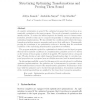Free Online Productivity Tools
i2Speak
i2Symbol
i2OCR
iTex2Img
iWeb2Print
iWeb2Shot
i2Type
iPdf2Split
iPdf2Merge
i2Bopomofo
i2Arabic
i2Style
i2Image
i2PDF
iLatex2Rtf
Sci2ools
ENTCS
2007
2007
Structuring Optimizing Transformations and Proving Them Sound
A compiler optimization is sound if the optimized program that it produces is semantically equivalent to the input program. The proofs of semantic equivalence are usually tedious. To reduce the efforts required, we identify a set of common transformation primitives that can be composed sequentially to obtain specifications of optimizing transformations. We also identify the conditions under which the transformation primitives preserve semantics and prove their sufficiency. Consequently, proving the soundness of an optimization reduces to showing that the soundness conditions of the underlying transformation primitives are satisfied. The program analysis required for optimization is defined over the input program whereas the soundness conditions of a transformation primitive need to be shown on the version of the program on which it is applied. We express both in a temporal logic. We also develop a logic called temporal transformation logic to correlate temporal properties over a p...
Related Content
| Added | 13 Dec 2010 |
| Updated | 13 Dec 2010 |
| Type | Journal |
| Year | 2007 |
| Where | ENTCS |
| Authors | Aditya Kanade, Amitabha Sanyal, Uday P. Khedker |
Comments (0)

